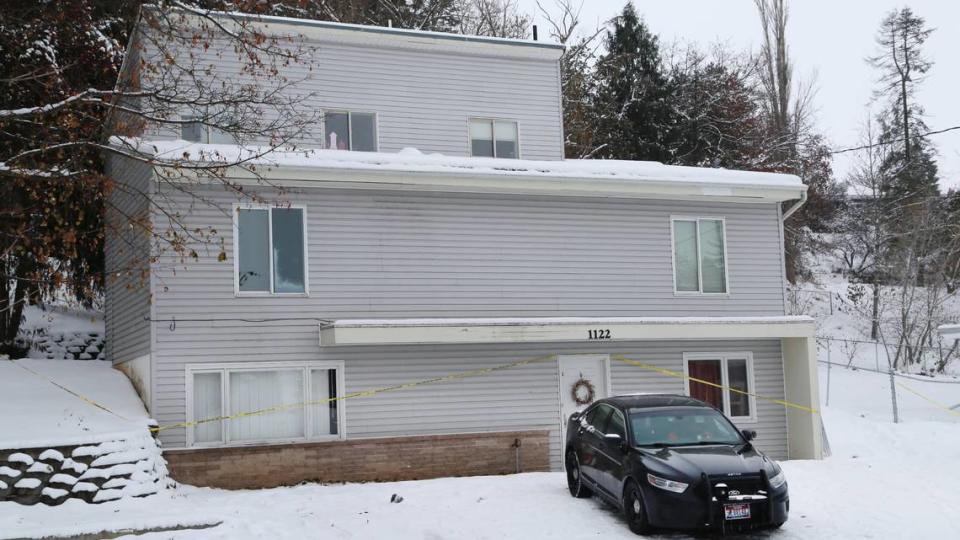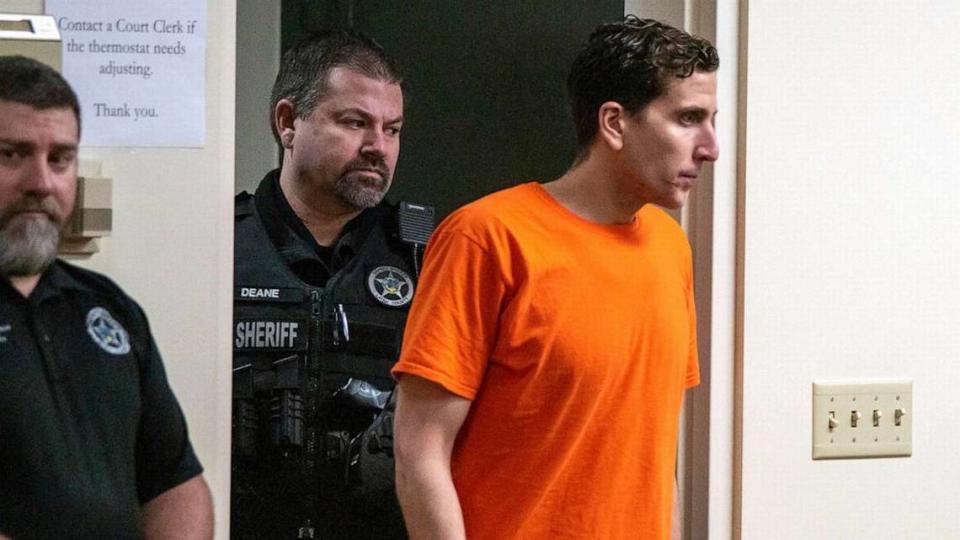Kohberger’s former school district won’t talk. But it turned over records for Moscow case
The Pennsylvania school district where Moscow homicide suspect Bryan Kohberger attended, and also later worked, turned over his student and employment records in response to a court-ordered subpoena.
Email correspondence between attorneys and administrators at the Pleasant Valley School District in Monroe County, Pennsylvania, revealed that the legal demand arrived in January, within three weeks of Kohberger’s arrest. The documents, obtained by the Idaho Statesman through a public records request, do not identify whether prosecutors or Kohberger’s public defender requested the subpoena, which in Idaho must be issued by a judge or clerk of the court.
Kohberger graduated from Pleasant Valley High School in 2013, including stints at the county’s technical school and the high school’s online program. He went on to work for the public school district as a part-time security officer from 2016 to 2021, his personnel records previously obtained by the Statesman showed.

Kohberger, 28, is charged with four counts of first-degree murder and one felony count of burglary in connection with the November slayings. The victims were University of Idaho students Madison Mogen, 21, Kaylee Goncalves, 21, Xana Kernodle, 20, and Ethan Chapin, 20.
Subpoenaed materials are not available to the public, but Kohberger’s high school transcripts were set to be among the district’s response to January’s subpoena, according to the emails. On the advice of a school attorney, the district planned to notify Kohberger of their release to satisfy the Family Educational Rights and Privacy Act (FERPA), a federal law that limits handing over such records without a student’s prior consent. The law includes an exception for subpoenas.
“We cannot just turn over his student records without placing him on notice of this,” attorney Mark Fitzgerald said in a Jan. 20 email to school district leaders. “My suggestion is send a notice to the (jail) in Idaho indicating that we intend on complying with the subpoena. Obviously this is the least of his problems but we need to adhere to the law here.”
Employee personnel files do not have the same protections, Fitzgerald told the district’s human resources director, CC’ing James Konrad, the superintendent.
Konrad and Pleasant Valley High School co-principals Jonathan Ayre and Brian Boylan haven’t responded to Statesman requests for comment dating to February, including a follow-up made earlier this month.
The Statesman’s formal request for records from the school district about Kohberger’s prior employment also was partially denied. In its February response, the district said it withheld several documents, citing several Pennsylvania exemptions, including non-criminal investigations or complaints, written criticisms of an employee, or discipline, demotion or discharge records in a personnel file.
Kohberger resigned from his position in June 2021, school district records showed.
“I decided to resign or retire freely and voluntarily after considering my options …” a district resignation/retirement form letter signed by Kohberger read. “… I understand that if I do not resign, I have a right to a school board hearing to determine if I should be dismissed from employment with the school district.”
‘A pretty decent worker’
Former Pleasant Valley security supervisor George Curcio hired Kohberger for his school district position. He told the Statesman that he remembered Kohberger as reserved, courteous and polite — a reliable employee for whom he couldn’t recall ever receiving a complaint.
“He was a pretty decent worker, always there, not one of those guys who would show up when he wanted to,” Curcio said in a phone interview. “He was quiet in a strange sort of way, but nothing that ever really reared its head with us.”
In December 2018, Kohberger was credited with helping save the life of a district staff member after she had a medical emergency at the high school, The Pocono Record reported. Luis Fuentes, the district security officer who acted as lead on the incident, deferred comment about Kohberger to the superintendent in February during a Statesman reporter’s visit to his Monroe County home.
Kohberger’s job, which did not include carrying a weapon, entailed working 8-hour shifts on Saturdays and Sundays as part of 24/7 security at the district’s four school buildings, Curcio said. When another officer called out, Kohberger often would volunteer to work an extra four hours on his weekend assignment, he said, shuttling between schools to ensure buildings were locked and utilities were operating properly.
“You’d drive up, check all the doors, hit the security button to show you’re doing your job, check the boilers, the air conditioners, school room doors, look for broken windows and open windows,” Curcio said. “So basically patrolling.”
Now, homicide investigators allege they have probable cause to believe Kohberger “conducted surveillance” on the off-campus rental home in Moscow in the months leading up to the four students’ deaths on Nov. 13. His cellphone location data showed he connected to cell towers near the area at least 12 times, police said in an affidavit. All but one of those instances was late at night or early in the morning, they said.

During Kohberger’s tenure with the school district, he earned an associate’s degree in psychology in May 2018 from Northampton Community College in eastern Pennsylvania, according to a school commencement list. He went on to graduate with a bachelor’s degree in psychology from DeSales University in June 2020.
A year later, when Kohberger resigned from his weekend security job, Curcio said, Kohberger told him he was going back to school full time. Kohberger finished his graduate studies at DeSales in June 2022, the university said. One of his former professors told The Daily Mail that Kohberger received his master’s degree from the university’s online criminal justice program.
After Kohberger finished at DeSales, he moved to Pullman, Washington, about 9 miles west of Moscow, to begin study last August toward a Ph.D. in Washington State University’s criminal justice and criminology graduate program.
School district stays tight-lipped
Law enforcement arrested Kohberger on Dec. 30 at his parents’ eastern Pennsylvania home while he was there during winter break from school. Police at the same time executed search warrants at the home, as well as at Kohberger’s WSU office and student apartment in Pullman.
On the list of items they were seeking were any weapons, including knives. Investigators said they found a leather sheath for a combat-style Ka-Bar brand knife stamped USMC — U.S. Marine Corps — next to the body of one of the victims at the crime scene. A single source of male DNA was later discovered on the button snap of the sheath, which police said they linked to Kohberger.
On Jan. 4, police transported Kohberger from Pennsylvania to Moscow, where he remains in the Latah County Jail on no bond. He awaits his preliminary hearing scheduled to start June 26.

In the nearly four months since Kohberger was taken into custody, the Pleasant Valley School District has remained tight-lipped. That’s in spite of repeated requests for comment from more than a dozen media outlets, including the Statesman, according to email records, and the Kohberger family being well-known within the district.
Kohberger’s two older sisters attended the same school system, and their parents also spent lengthy tenures working there. Kohberger’s father retired in June 2019 after 12 1/2 years as a maintenance worker with the district, followed by his mother retiring in June 2020 after 16 years as education support staff, their school district personnel records obtained by the Statesman showed.
While in high school, Bryan Kohberger was enrolled in the half-day technical school’s law enforcement program as a sophomore. A photo of Kohberger in Pleasant Valley High School’s 2010-2011 yearbook that the Statesman reviewed showed him in a uniform with a caption noting he aspired to be an Army Ranger. But a former high school friend previously told the Statesman that Kohberger’s main interest was joining law enforcement.
By Kohberger’s junior year, he switched his technical school focus to heating, ventilation and air conditioning, or HVAC — a specialty that aligned with his father’s skill set. After 4 1/2 years in the Air Force, Kohberger’s dad earned certifications, including in HVAC, from technical programs, according to a six-page résumé he included in a 2006 job application with the district.
School district leadership has still yet to issue a single public statement about Kohberger, a former employee of 5 1/2 years whose education began at Pleasant Valley Elementary School, his 2015 job application detailed. The district’s email records obtained by the Statesman indicate that’s by design.
Late on the day police arrested Kohberger, district leadership spent time with Fitzgerald, Pleasant Valley’s attorney, workshopping an internal communication that was sent to all district staff.
“A former student and employee, Bryan Kohberger, has been taken into custody in connection with the 4 college students that were killed in Idaho. If you are contacted by news or media in relation to Bryan Kohberger, we ask that you respond with no comment as this is an ongoing investigation,” read a draft of the employee notification penned by Rae Lin Howard, the district’s assistant superintendent.
Fitzgerald instead advised highlighting the sudden nature of the information, and referencing FERPA “and other applicable state law protections” as the reason for not commenting. That advice was incorporated into the email Howard sent to the school board and all district employees.
“… We are learning this news just like you. Media outlets could reach out to staff. Due to FERPA privacy protections and other applicable state law protections we cannot comment any further at this time,” the latter portion of that email read.
In fact, FERPA restricts only the release of education records that “contain information directly related to a student” and maintained by the institution. The federal law does not prohibit a district from commenting altogether, or district employees with information “obtained through personal knowledge or observation” from providing it, unless the employee was involved with producing the protected record, according to a U.S. Department of Education FERPA guidance document.
A Statesman request of district leadership to address their position on FERPA and clarify the other Pennsylvania laws that applied and barred comment went unanswered.
Meanwhile, Michael Simonetta, the district’s business manager who also oversees its public records requests, resolved not to respond to any media outlets seeking comment unless they made official public records requests, the emails showed. He took the advice of attorneys for the district, Fitzgerald and Alicia Luke, to automatically issue a 30-day extension permitted under Pennsylvania law.
“I’m guessing the drive-by media will have likely moved on to the next shiny thing,” Fitzgerald wrote in a Dec. 31 email.
“Thanks Mark, exactly what I am thinking,” Simonetta replied. “I just don’t want it to look bad for the district by delaying.”
“I surmise even those few that are actual (records) requests won’t even hold the attention of the requesters by the time we actually respond, for the reasons Mark discussed,” Luke added Jan. 3.
Subpoena signals possible legal strategy
The subpoena two weeks later for Kohberger’s academic and employee records, however, required the school district to respond.
It remains unclear whether Kohberger’s defense or Latah County prosecutors sought the documents, or for what purpose. A gag order issued by the judge in the case restricts attorneys on both sides from commenting outside of the court record, for which there is no filing related to the school district subpoena.
Edwina Elcox is a criminal defense attorney in Boise who previously served as an Ada County deputy prosecutor. She told the Statesman in an interview that it could be either side that requested the legal demand sent to the school district, but that details in the emails, provided to her by the Statesman, indicate that it’s more likely to have been the prosecution.
“If we’re playing connect the dots here, I think it would be the state,” Elcox said by phone. “The district is complying with the subpoena and saying we have to notify him of this, so they’re saying we’re covering our bases with him.”
Kohberger, on the other hand, and his attorney on his behalf, could request his academic records from the district without having to ask the court to issue a subpoena. And that would be a prudent choice, Elcox said, to avoid sharing a possible legal strategy with the prosecution at this stage of the case.
Kohberger’s attorneys may want the same records if they help document their client’s past educational challenges or a mental health history that helps in his defense, she said. Kohberger is believed to have posted on an online forum between 2009 and 2012 about suffering from a rare brain disorder known as visual snow. He also complained of the condition to friends at the time.
His district personnel file might also show a work history absent any problems to help persuade a jury that he is not the killer, Elcox said. Prosecutors, meanwhile, would be looking for information included in the records to prove the opposite, she said.
“They are casting a wide net,” Elcox said. “They are looking for … evidence of other prior wrongs, bad acts, things to show intent, motive, lack of mistake. Theoretically, it’s a literal goldmine, if in an official capacity, there was documented concern that he demonstrates this kind of inappropriate behavior, tendencies, auctions, patterns and he did it again. What they’re showing is, ‘Hey, these behaviors, there’s no mistake here.’ ”
